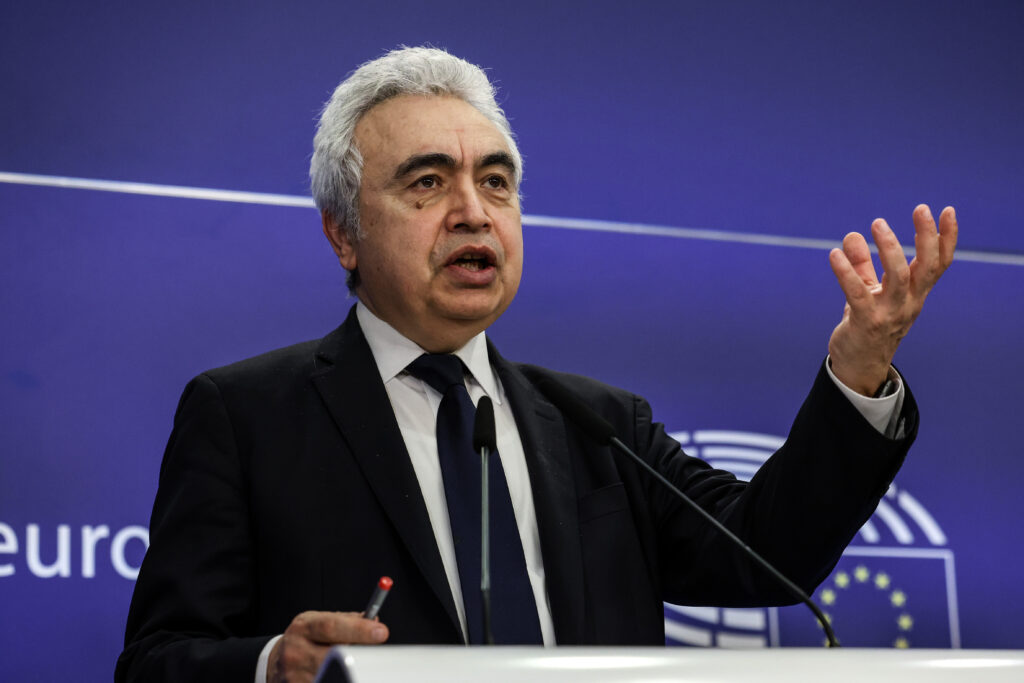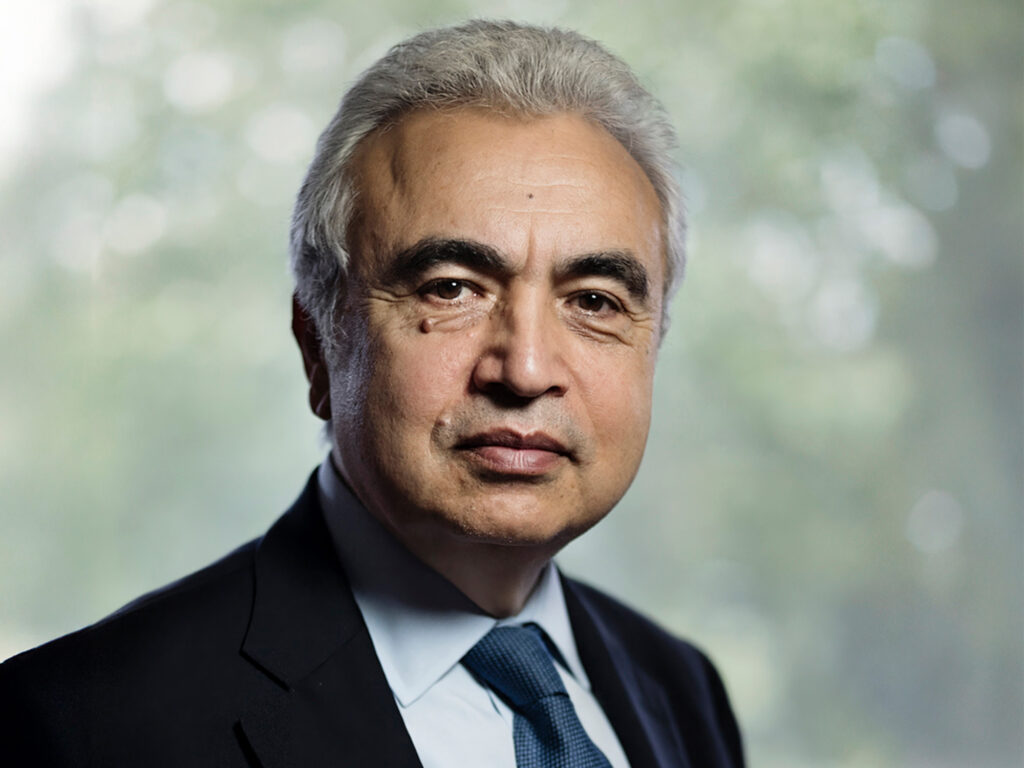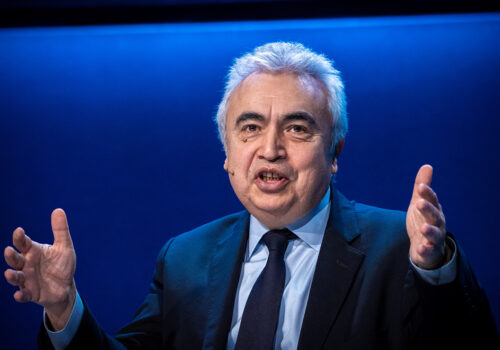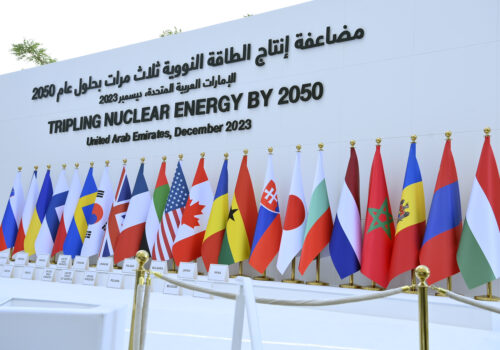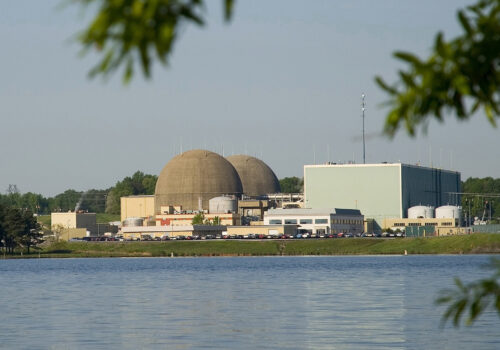Watch the full event
“Today I can confirm that nuclear is making a comeback,” said Fatih Birol, the executive director of the International Energy Agency (IEA) at an Atlantic Council event on Thursday. Birol, who is also an Atlantic Council International Advisory Board member, spoke about his organization’s first-ever report dedicated solely to nuclear energy and what its findings could mean for the future of global energy security.
“More than forty countries have concrete plans and projects in place to build or expand their nuclear capacity,” said Birol. “We have never seen this before.”
The IEA, an independent intergovernmental organization based in Paris, commissioned its report on nuclear energy in June 2024 amid growing global interest in nuclear power and increased electricity demand. Birol discussed the reasons for the recent resurgence, the challenges hindering the nuclear industries in the United States and Europe, and what he believes Western policymakers will need to do to ensure that nuclear power helps provide energy security.
“From the IEA’s point of view, energy security is the full spectrum of the traditional energy security risks plus the emerging energy security risks, such as critical mineral supply chains,” said Birol.
Read below for more highlights from the discussion with Birol on the state of nuclear energy, which was moderated by Atlantic Council President and CEO Frederick Kempe.
A growing global interest in nuclear power
- Birol said increased demand for electricity is a major factor in the push for nuclear energy, including growing demand for air conditioning and artificial intelligence data centers. “In the age of strong electricity demand growth,” he said, “countries are moving forward to make nuclear part of the power generation mix again.”
- “We have never seen such a big amount of the construction of nuclear power plants in the last three decades,” Birol said. He mentioned Italy, Japan, Sweden, and other countries that are showing renewed interest in nuclear energy after previous opposition. He also noted “strong momentum” from countries such as Poland and Turkey, which have demonstrated interest in launching their first nuclear energy projects.
- Birol also highlighted the growing interest in developing small modular reactors, which he said are “easier to finance,” “more flexible, less complex projects to implement,” and “faster to build” compared to traditional large-scale nuclear power plants.
Difficulties ahead
- Despite the increased enthusiasm for nuclear projects, including in the West, the IEA found that there are significant challenges to project implementation and increasingly stiff competition from China. “In the last five years, more than 80 percent of the new nuclear capacity came from China,” Birol said. He added that “China, with the current policies, before the end of this decade will overtake the United States and will be the number one nuclear power in the world.”
- One of the reasons China has made such strides, Birol said, is that in the United States and Europe, “it is rare that a project finishes on time and on budget.” He added that, on average, US and European nuclear projects face eight years of delay and cost more than two-and-a-half times the planned budget.
- Birol also highlighted the need for countries to develop greater enrichment capacity. Russia alone currently holds more than 40 percent of the world’s uranium enrichment capacity, according to the IEA’s analysis. “In Europe, we have experienced the bitter consequence of over-reliance on one single country” for energy, Birol said. “Diversification is the magic word.”
Nuclear priorities for the US and Europe
- Birol outlined potential areas of cooperation between the IEA and the new US administration, including “pushing the innovation button” to bring down the costs of developing small modular reactors, as well as collaboration on geothermal energy and carbon capture and storage.
- Birol also spoke about how Western nations can become the partners of choice for countries seeking to develop their first nuclear power plants. To win partners for future nuclear projects, he stressed the importance of making long-term commitments to advancing nuclear energy initiatives and avoiding an inconsistent “stop-and-go” approach.
- “We need governments to be creative” when it comes to funding nuclear energy projects, Birol said, since it can take a long time for private funders to reap their returns on investment. He suggested that governments could “provide instruments to the investments and guarantee some of the revenues” to get more buy-in from private capital.
Daniel Hojnacki is an assistant editor on the editorial team at the Atlantic Council.
Watch the full event
Further reading
Thu, Feb 6, 2025
IEA’s Fatih Birol on the state of nuclear energy advancement around the world
Transcript By
The International Energy Agency executive director spoke at an Atlantic Council Front Page event about cooperation among governments and the energy industry on nuclear energy.
Wed, Jan 15, 2025
Tripling global nuclear energy capacity is in reach—if the world seizes the moment
EnergySource By Amy Drake
At COP28, nations and corporations committed to tripling global nuclear energy capacity by 2050, underscoring its essential role in achieving net-zero emissions. Looking ahead to COP30, global leaders must strengthen multilateral collaboration, engage the financial sector, and provide support for new partnerships with the nuclear industry to meet this goal.
Tue, Oct 29, 2024
Tech companies are showing a new, strong interest in nuclear power. Here’s why.
New Atlanticist By Jennifer T. Gordon, Lauren Hughes
Recent announcements by Google and Amazon demonstrate a willingness to finance the development and deployment of advanced reactors for their own energy requirements.
Image: Brussels, Belgium. March 9, 2023. Fatih Birol, executive director of the International Energy Agency (IEA), during a joint press conference about the energy situation one year after the beginning of the Russian invasion of Ukraine, at the European Parliament headquarters. Photograph by Valeria Mongelli / Hans Lucas.
